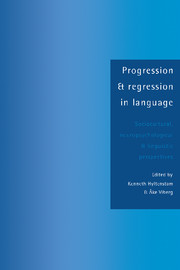 Progression and Regression in Language
Progression and Regression in Language Book contents
- Frontmatter
- Contents
- List of contributors
- Preface
- INTRODUCTION
- THE SOCIOCULTURAL SETTING
- PSYCHO- AND NEUROLINGUISTIC ASPECTS
- 6 Neurolinguistic aspects of first language acquisition and loss
- 7 Neurolinguistic aspects of second language development and attrition
- 8 Second language acquisition as a function of age: research findings and methodological issues
- 9 Second language regression in Alzheimer's dementia
- THE LINGUISTIC PERSPECTIVE 1: DISCOURSE, GRAMMAR, AND LEXIS
- THE LINGUISTIC PERSPECTIVE 2: PHONOLOGY
- Index
9 - Second language regression in Alzheimer's dementia
Published online by Cambridge University Press: 06 July 2010
- Frontmatter
- Contents
- List of contributors
- Preface
- INTRODUCTION
- THE SOCIOCULTURAL SETTING
- PSYCHO- AND NEUROLINGUISTIC ASPECTS
- 6 Neurolinguistic aspects of first language acquisition and loss
- 7 Neurolinguistic aspects of second language development and attrition
- 8 Second language acquisition as a function of age: research findings and methodological issues
- 9 Second language regression in Alzheimer's dementia
- THE LINGUISTIC PERSPECTIVE 1: DISCOURSE, GRAMMAR, AND LEXIS
- THE LINGUISTIC PERSPECTIVE 2: PHONOLOGY
- Index
Summary
INTRODUCTION
The bulk of research on language attrition has dealt with monolingual speakers and has traditionally focused on individuals suffering from aphasia (Goodglass and Kaplan, 1972). More recently, nonpathological cases of language attrition and normal language changes in late phases of the lifespan have attracted a greater share of research interest (cf. e.g. articles in Seliger and Vago, 1991), but it is only during the last two decades that language regression related to dementia has become a topic of focused research (see Obler, 1983; Bayles and Kaszniak, 1987). Work on dementia has been especially concerned with Alzheimer's disease, where the successive nature of the deterioration provides possibilities for a longitudinal investigation of language regression, something that is excluded in the case of aphasia with its abrupt onset. Furthermore, the degree of uniformity between cases is seemingly large enough to allow a determination of stages of linguistic regression (Obler and Albert, 1984).
Research in the area of language loss in bilinguals is no exception to the generalizations presented above. Bilingual aphasia has long been the preferred field of study (see, for example, Paradis, 1977, 1983; Albert and Obler, 1978), and this research has been of the utmost importance for the understanding of the psycho- and neurolinguistics of bilingualism. While studies of second and foreign language attrition have more recently also begun to play a great role in research (see articles in Lambert and Freed, 1982, and Weltens, de Bot and van Els, 1986, and the overview in Weltens, 1987), bilingual dementia has still hardly begun to be addressed at all – excepting a handful of recent studies in the field.
- Type
- Chapter
- Information
- Progression and Regression in LanguageSociocultural, Neuropsychological and Linguistic Perspectives, pp. 222 - 242Publisher: Cambridge University PressPrint publication year: 1994
- 3
- Cited by
